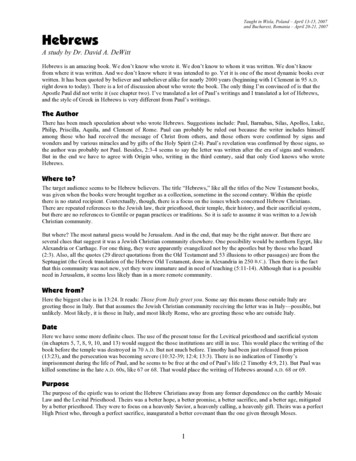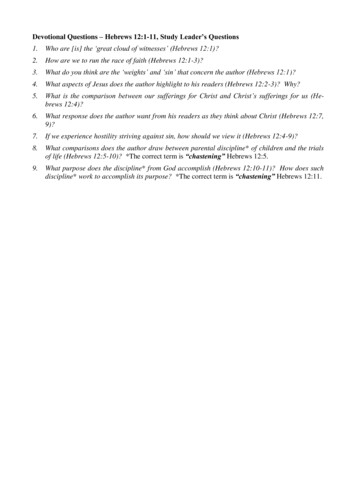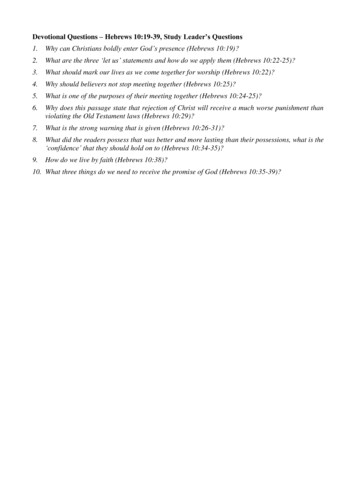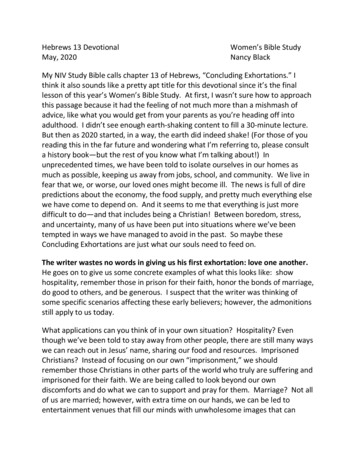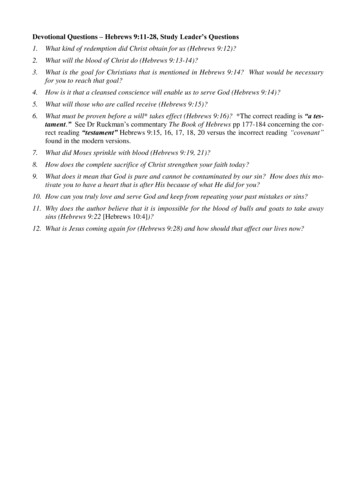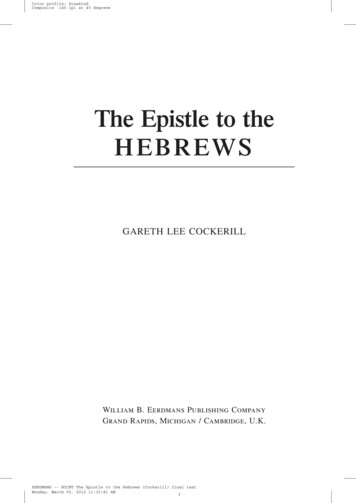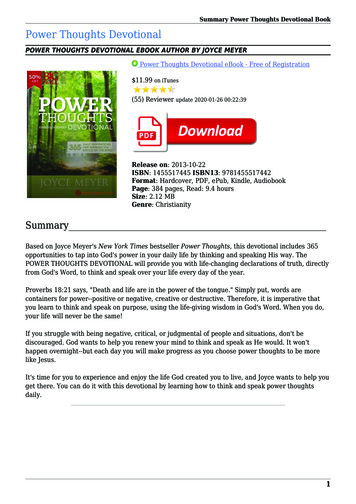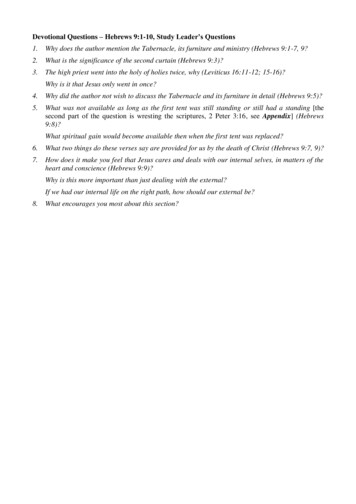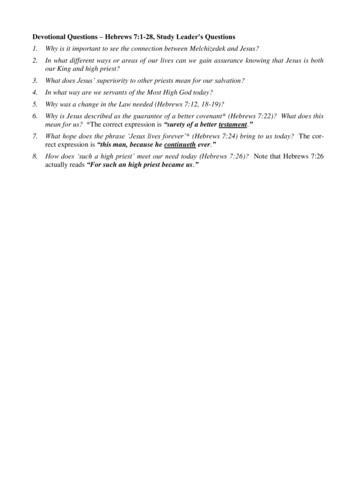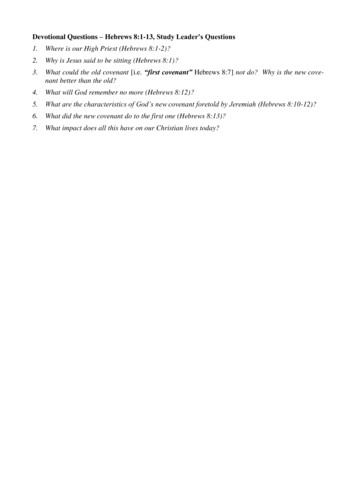
Transcription
Devotional Questions – Hebrews 8:1-13, Study Leader’s Questions1.Where is our High Priest (Hebrews 8:1-2)?2.Why is Jesus said to be sitting (Hebrews 8:1)?3.What could the old covenant [i.e. “first covenant” Hebrews 8:7] not do? Why is the new covenant better than the old?4.What will God remember no more (Hebrews 8:12)?5.What are the characteristics of God’s new covenant foretold by Jeremiah (Hebrews 8:10-12)?6.What did the new covenant do to the first one (Hebrews 8:13)?7.What impact does all this have on our Christian lives today?
2Devotional Questions – Hebrews 8:1-13, Answers to QuestionsSee Dr Ruckman’s commentaries Minor Prophets Volume II Habakkuk-Malachi pp 444-449 and TheBook of Hebrews pp 150-157, 207 and the Ruckman Reference Bible pp 855, 1028-1029, 1033, 1233,1434, 1442, 1502, 1606-1607 for detailed comments.1.Where is our High Priest (Hebrews 8:1-2)?“We have such an high priest, who is set on the right hand of the throne of the Majesty in theheavens” Hebrews 8:1.Observe that this throne is “the throne of God,” which is in “heaven itself,” singular, which inturn is “the third heaven,” singular, but “heavens,” plural, is also the correct term because Godis omnipresent and therefore “the Majesty in the heavens.” Sometimes “heavens” are referredto collectively as “heaven.” The following scriptures show these applications of the words“heaven” and “heavens.”“But will God indeed dwell on the earth? behold, the heaven and heaven of heavens cannotcontain thee; how much less this house that I have builded?” 1 Kings 8:27. See also 2Chronicles 2:6, 6:18.“Can any hide himself in secret places that I shall not see him? saith the LORD. Do not I fillheaven and earth? saith the LORD” Jeremiah 23:24. Here “heaven” is interchangeable with“heavens.”“And he that shall swear by heaven, sweareth by the throne of God, and by him that sitteththereon” Matthew 23:22. Here “heaven” would correspond to “the third heaven.”“I knew a man in Christ above fourteen years ago, (whether in the body, I cannot tell; orwhether out of the body, I cannot tell: God knoweth;) such an one caught up to the thirdheaven” 2 Corinthians 12:2.“For Christ is not entered into the holy places made with hands, which are the figures of thetrue; but into heaven itself, now to appear in the presence of God for us” Hebrews 9:24. Here“heaven” would correspond to “the third heaven.”“Looking unto Jesus the author and finisher of our faith; who for the joy that was set beforehim endured the cross, despising the shame, and is set down at the right hand of the throne ofGod” Hebrews 12:2, underlining that “God is in heaven” Ecclesiastes 5:2 i.e. “the thirdheaven.”.The significance of “the right hand” is the power that God has given to the Lord Jesus Christ toexercise for the sake of “them that believe on his name,” which directly yields individual salvation.Salvation of the individual necessitates “the power of Christ” 2 Corinthians 12:9, which is “thepower of an endless life” Hebrews 7:16 because Paul says of the Lord Jesus Christ “Thou art apriest for ever after the order of Melchisedec” Hebrews 5:6, 7:17, 21 - see also Psalm 110:4 –and therefore in turn “But this man, because he continueth ever, hath an unchangeablepriesthood” Hebrews 7:24.Note also:“Jesus saith unto him, Thou hast said: nevertheless I say unto you, Hereafter shall ye see theSon of man sitting on the right hand of power, and coming in the clouds of heaven” Matthew26:64. See also Mark 14:62.“And Jesus came and spake unto them, saying, All power is given unto me in heaven and inearth” Matthew 28:18.“But as many as received him, to them gave he power to become the sons of God, even to themthat believe on his name” John 1:12.
3“For I am not ashamed of the gospel of Christ: for it is the power of God unto salvation toevery one that believeth; to the Jew first, and also to the Greek” Romans 1:16.“But we preach Christ crucified, unto the Jews a stumblingblock, and unto the Greeks foolishness; But unto them which are called, both Jews and Greeks, Christ the power of God, andthe wisdom of God” 1 Corinthians 1:23-24.In sum, the Lord Jesus Christ is He “Who is gone into heaven, and is on the right hand of God;angels and authorities and powers being made subject unto him” 1 Peter 3:22 and as “thepower of God” 1 Corinthians 1:24 now exercises “all power” Matthew 28:18 on behalf of believers today.See also 1 Corinthians 5:4, 2 Peter 1:16, Revelation 12:10.2.Why is Jesus said to be sitting (Hebrews 8:1)?First, because He could say to His Father “I have glorified thee on earth: I have finished thework which thou gavest me to do” John 17:4, according to the Lord’s testimony at Calvary.“When Jesus therefore had received the vinegar, he said, It is finished: and he bowed hishead, and gave up the ghost” John 19:30.In that sense, therefore, the Lord Jesus Christ could, as He said, rest from “the works which theFather hath given me to finish” John 5:36.“For he that is entered into his rest, he also hath ceased from his own works, as God did fromhis” Hebrews 4:10.That is another reason why Hebrews 8:1 describes the Lord Jesus Christ as “set on the righthand of the throne of the Majesty in the heavens.” See Question 1 and the significance of theexpression “the right hand.”Note the contrast therefore, between the Old Testament priests, who could not rest from theirworks because the furnishings of the tabernacle had no seating arrangements as Hebrews 9:1-5shows and their work was never finished “For it is not possible that the blood of bulls and ofgoats should take away sins” Hebrews 10:4, and the Lord Jesus Christ Who “hath ceased fromhis own works” with respect His sacrifice for sin and sins:“And every priest standeth daily ministering and offering oftentimes the same sacrifices,which can never take away sins: But this man, after he had offered one sacrifice for sins forever, sat down on the right hand of God” Hebrews 10:11-12.Second, the Lord is said to be sitting because His Return has been postponed. Had the Jews accepted Stephen’s testimony, the Lord would have returned according to Matthew 26:64, Mark14:62 but they did not.“But he, being full of the Holy Ghost, looked up stedfastly into heaven, and saw the glory ofGod, and Jesus standing on the right hand of God, And said, Behold, I see the heavensopened, and the Son of man standing on the right hand of God. Then they cried out with aloud voice, and stopped their ears, and ran upon him with one accord, And cast him out of thecity, and stoned him: and the witnesses laid down their clothes at a young man's feet, whosename was Saul” Acts 7:55-58.Having forced the Second Advent to be postponed for 2000 years, Stephen’s murderers andthose of “Jesus, who ye slew and hanged on a tree” Acts 5:30 will nevertheless see Matthew26:64, Mark 14:62 fulfilled, even if from “under the earth” Revelation 5:13.“Behold, he cometh with clouds; and every eye shall see him, and they also which piercedhim: and all kindreds of the earth shall wail because of him. Even so, Amen” Revelation 1:7.The Lord Jesus Christ is only seated “till he come” 1 Corinthians 11:26.
43.What could the old covenant [i.e. “first covenant” Hebrews 8:7] not do? Why is the new covenant better than the old?In the context of Hebrews 8:6-13 “first covenant” could not of itself: Ensure that Israel would keep it i.e. “they continued not in my covenant” Hebrews 8:9.“They are turned back to the iniquities of their forefathers, which refused to hear mywords; and they went after other gods to serve them: the house of Israel and the house ofJudah have broken my covenant which I made with their fathers” Jeremiah 11:10. Inscribe God’s laws on Israel’s heart, Hebrews 8:10. “I have written to him the greatthings of my law, but they were counted as a strange thing” Hosea 8:12. Retain the God of Israel as Israel’s God, Hebrews 8:10. “Then said God, Call his nameLoammi: for ye are not my people, and I will not be your God” Hosea 1:9. Enable every man of Israel to know the Lord, Hebrews 8:11. “The ox knoweth his owner,and the ass his master’s crib: but Israel doth not know, my people doth not consider. Ahsinful nation, a people laden with iniquity, a seed of evildoers, children that are corrupters:they have forsaken the LORD, they have provoked the Holy One of Israel unto anger, theyare gone away backward” Isaiah 1:3-4. Make God forget Israel’s unrighteousness, Hebrews 8:12. “But I will punish you accordingto the fruit of your doings, saith the LORD: and I will kindle a fire in the forest thereof,and it shall devour all things round about it” Jeremiah 21:14, an important verse for Britaintoday, with Ezekiel 39:6 “And I will send a fire on Magog, and among them that dwellcarelessly in the isles: and they shall know that I am the LORD.”Note in passing that, in accordance with Hebrews 8:12, God’s mercy does not depart from Israel, even though He must inflict judgement on the nation’s wrongdoing. “It is of theLORD’S mercies that we are not consumed, because his compassions fail not. They arenew every morning: great is thy faithfulness” Lamentations 3:22, 23, which, thankfully, canalso apply to the Christian. The expression “his mercy endureth for ever” occurs 41 times inscripture, in particular with respect to Israel. See especially Psalm 136:1-26, where the expression “his mercy endureth for ever” occurs in each verse.The new covenant is better because it will put right all the above ills at the Second Advent. SeeQuestion 6.“But Israel shall be saved in the LORD with an everlasting salvation: ye shall not be ashamednor confounded world without end” Isaiah 45:17.“As for me, this is my covenant with them, saith the LORD; My spirit that is upon thee, andmy words which I have put in thy mouth, shall not depart out of thy mouth, nor out of themouth of thy seed, nor out of the mouth of thy seed’s seed, saith the LORD, from henceforthand for ever” Isaiah 59:21.“In his days Judah shall be saved, and Israel shall dwell safely: and this is his name wherebyhe shall be called, THE LORD OUR RIGHTEOUSNESS” Jeremiah 23:6.“And so all Israel shall be saved: as it is written, There shall come out of Sion the Deliverer,and shall turn away ungodliness from Jacob: For this is my covenant unto them, when I shalltake away their sins” Romans 11:23.The above references show that the Christian can take comfort that God will do what He says Hewill do.“God is not a man, that he should lie; neither the son of man, that he should repent: hath hesaid, and shall he not do it? or hath he spoken, and shall he not make it good?” Numbers23:19, which is applicable today.
5“But the Lord is faithful, who shall stablish you, and keep you from evil” 2 Thessalonians 3:3,which is applicable today, noting that “stablish” has the sense of God stabilising the believer insofar as “And whatsoever ye do in word or deed, do all in the name of the Lord Jesus, givingthanks to God and the Father by him” Colossians 3:17, in particular as in the immediate context of 2 Thessalonians 3:3, which is a great encouragement.“And the Lord direct your hearts into the love of God, and into the patient waiting for Christ”2 Thessalonians 3:5. The believer today really has nothing else to do.4.What will God remember no more (Hebrews 8:12)?Specifically, the corporate unrighteousness, sins and iniquities of “the house of Israel and.thehouse of Judah” Hebrews 8:8 at the Second Advent. See Question 3.“Who hath heard such a thing? who hath seen such things? Shall the earth be made to bringforth in one day? or shall a nation be born at once? for as soon as Zion travailed, she broughtforth her children” Isaiah 66:8.“Who is a God like unto thee, that pardoneth iniquity, and passeth by the transgression of theremnant of his heritage? he retaineth not his anger for ever, because he delighteth in mercy.He will turn again, he will have compassion upon us; he will subdue our iniquities; and thouwilt cast all their sins into the depths of the sea” Micah 7:18-19.“For behold the stone that I have laid before Joshua; upon one stone shall be seven eyes: behold, I will engrave the graving thereof, saith the LORD of hosts, and I will remove the iniquity of that land in one day” Zechariah 3:9.“And I will pour upon the house of David, and upon the inhabitants of Jerusalem, the spiritof grace and of supplications: and they shall look upon me whom they have pierced, and theyshall mourn for him, as one mourneth for his only son, and shall be in bitterness for him, asone that is in bitterness for his firstborn” Zechariah 12:10.The above passages describe Israel’s corporate repentance toward and reception of her Messiah,Daniel 9:25, 26 at the Second Advent and are the basis for Peter’s exhortation to the Jews afterthe healing of the lame man.“Repent ye therefore, and be converted, that your sins may be blotted out, when the times ofrefreshing shall come from the presence of the Lord” Acts 3:19.It is the Second Advent that ushers in “the times of refreshing.from the presence of the Lord”when Israel’s sins corporately are “blotted out” as the following passages show.“And many people shall go and say, Come ye, and let us go up to the mountain of the LORD,to the house of the God of Jacob; and he will teach us of his ways, and we will walk in hispaths: for out of Zion shall go forth the law, and the word of the LORD from Jerusalem. Andhe shall judge among the nations, and shall rebuke many people: and they shall beat theirswords into plowshares, and their spears into pruninghooks: nation shall not lift up swordagainst nation, neither shall they learn war any more” Isaiah 2:3-4.“Of the increase of his government and peace there shall be no end, upon the throne ofDavid, and upon his kingdom, to order it, and to establish it with judgment and with justicefrom henceforth even for ever. The zeal of the LORD of hosts will perform this” Isaiah 9:7.“In those days, and in that time, saith the LORD, the iniquity of Israel shall be sought for,and there shall be none; and the sins of Judah, and they shall not be found: for I will pardonthem whom I reserve” Jeremiah 50:20.Paul likewise refers to the time when “when I will make a new covenant with the house of Israel and with the house of Judah” Hebrews 8:8.
6“And so all Israel shall be saved: as it is written, There shall come out of Sion the Deliverer,and shall turn away ungodliness from Jacob: For this is my covenant unto them, when I shalltake away their sins” Romans 11:26-27.Romans 11:26-27 refers directly to Old Testament prophecies that were not fulfilled at the FirstAdvent - which is why Paul, writing after Calvary, cites them - will be fulfilled literally at theSecond Advent and cannot be spiritualised to apply doctrinally to the Church.“By this therefore shall the iniquity of Jacob be purged; and this is all the fruit to take awayhis sin; when he maketh all the stones of the altar as chalkstones that are beaten in sunder,the groves and images shall not stand up” Isaiah 27:9. Israel’s national corporate repentance atthe Second Advent will have to do with destruction of idols as in the reign of King Josiah. “Andthey brake down the altars of Baalim in his presence; and the images, that were on highabove them, he cut down; and the groves, and the carved images, and the molten images, hebrake in pieces, and made dust of them, and strowed it upon the graves of them that had sacrificed unto them” 2 Chronicles 34:4.“And the Redeemer shall come to Zion, and unto them that turn from transgression in Jacob,saith the LORD. As for me, this is my covenant with them, saith the LORD; My spirit that isupon thee, and my words which I have put in thy mouth, shall not depart out of thy mouth,nor out of the mouth of thy seed, nor out of the mouth of thy seed’s seed, saith the LORD,from henceforth and for ever” Isaiah 59:20-21.Note that Isaiah 59:21 in particular matches Jeremiah 31:31-35 with Hebrews 8:10 insofar as“for out of the abundance of the heart the mouth speaketh” Matthew 12:34. See Question 5.It should be remembered that God’s “new covenant with the house of Israel and with thehouse of Judah” Hebrews 8:8 is not “my blood of the new testament, which is shed for manyfor the remission of sins” Matthew 26:28* as that “new testament” applies today. *The 1978,1984, 2011 NIVs, it should be noted, cut out the word “new” from Matthew 26:28 with a misleading footnote to the effect that some manuscripts include the word “new.” J. A. Moorman inEarly Manuscripts and the Authorized Version p 73 states that the word “new” is found in themajority of manuscripts, including up to 26 of the early uncial manuscripts, 10 Old Latin copiesand the Peshitta Syriac, the texts of which certainly date as far back as the 2 nd century A.D.The faithful pre-1611 pre-cursors to the AV1611; the 1385, 1395 Wycliffe Bibles and the Tyndale, Coverdale, Matthew, Great, Bishops’, Geneva Bibles, the Bibles of the 16th century English Protestant Reformation, all read “the new testament” in agreement with the AV1611.Even the 1582 JR Jesuit-Rheims New Testament and the 1749-1752 Challoner’s Revision of theDR Douay-Rheims version retain “the new testament” in Matthew 26:28.Only a small number of manuscripts, including 5 of the old uncials, read as the NIVs, typicallyheaded up by the usual suspects i.e. Aleph Sinaiticus and Vaticanus B. It is therefore no surprisethat the 1881 RV and the 1901 ASV read as the NIVs with “the covenant.” Dr Moorman, ibid.p 84, notes that the same distribution of witnesses for and against the word “new” is found inMark 14:24, where again the NIVs read “the covenant.” Dr Moorman rightly observes thatMatthew 26:28 does not merely address a covenant but the sealing of a whole new dispensation.God’s “new covenant with the house of Israel and with the house of Judah” Hebrews 8:8-12makes no reference to God’s blood, Acts 20:28 “shed for many for the remission of sins” and“my blood of the new testament” – note the word “testament” as distinct from “covenant” –makes no mention of God writing any of His laws on anyone’s heart after the manner of Hebrews 8:10. No Christian today could recite, say, even Exodus 20, without a conscious effort to“Let the word of Christ dwell in you richly in all wisdom” Colossians 3:16, even if “filled withthe Holy Ghost” Acts 4:31 but the recipients of God’s “new covenant with the house of Israeland with the house of Judah” will not have to make that effort. God will do it for them under
7the terms and conditions of His “new covenant with the house of Israel and with the house ofJudah.” As indicated above, see Question 5.Moreover, “my blood of the new testament” Matthew 26:28 is not confined to “the house of Israel and.the house of Judah.”“And he is the propitiation for our sins: and not for ours only, but also for the sins of thewhole world” 1 John 2:2.It should also be remembered that Christians are not “the house of Israel and.the house ofJudah.” They are “the household of God” Ephesians 2:19, “the house of God, which is thechurch of the living God, the pillar and ground of the truth” 1 Timothy 3:15. Israel and Judah,it should be noted, are not God and God is not Israel and Judah.In sum, God’s “new covenant with the house of Israel and with the house of Judah” Hebrews8:8-12 and “my blood of the new testament” Matthew 26:28 are not the same. It is wresting thescriptures, 2 Peter 3:16, to insist otherwise.The Christian of course does have his sins “blotted out” Acts 3:19 with Micah 7:18-19, Zechariah 3:9 but now according to the terms and conditions of “my blood of the new testament,”which is a great encouragement, according to the Pauline Epistles to Christians.“And you, being dead in your sins and the uncircumcision of your flesh, hath he quickenedtogether with him, having forgiven you all trespasses; Blotting out the handwriting of ordinances that was against us, which was contrary to us, and took it out of the way, nailing it tohis cross” Colossians 2:13-14.The Christian therefore does not have to wait for the Second Advent for sins to be “blotted out”Acts 3:19 in the way that “the house of Israel and.the house of Judah” do corporately.In principle, of course, Hebrews 8:8-12 is for the Christian a reminder of God’s faithfulness tobelievers, which applies now as ever. See Question 3.“God is not a man, that he should lie; neither the son of man, that he should repent: hath hesaid, and shall he not do it? or hath he spoken, and shall he not make it good?” Numbers23:19
85.What are the characteristics of God’s new covenant foretold by Jeremiah (Hebrews 8:10-12)?See Questions 3, 4 and note again that God’s new covenant is “with the house of Israel andwith the house of Judah” not the Church. This new covenant puts right everything that the“first covenant” Hebrews 8:7 could not, as Jeremiah’s prophecy shows, at the Second Advent.“Behold, the days come, saith the LORD, that I will make a new covenant with the house ofIsrael, and with the house of Judah” Jeremiah 31:31 with Hebrews 8:8.This “new covenant” will because “the goodness of God endureth continually” Psalm 52:1 ensure that at the Second Advent: Israel keeps it. Whereas “in the day that I took them by the hand to bring them out of theland of Egypt.my covenant they brake” Jeremiah 31:32 with Hebrews 8:9, “Moreover Iwill make a covenant of peace with them; it shall be an everlasting covenant with them:and I will place them, and multiply them, and will set my sanctuary in the midst of them forevermore” Ezekiel 37:26. God’s laws are inscribed on Israel’s heart i.e. “But this shall be the covenant that I willmake with the house of Israel; After those days, saith the LORD, I will put my law in theirinward parts, and write it in their hearts; and will be their God, and they shall be my people” Jeremiah 31:33 with Hebrews 8:10. Isaiah 51:7 will come to pass for Israel, even if shestill has some hostile neighbours (probably Arabs who survived “great tribulation” Matthew24:21, Daniel 11:41) “Hearken unto me, ye that know righteousness, the people in whoseheart is my law; fear ye not the reproach of men, neither be ye afraid of their reviling.” God is permanently Israel’s God i.e. “But this shall be the covenant that I will make withthe house of Israel; After those days, saith the LORD, I will put my law in their inwardparts, and write it in their hearts; and will be their God, and they shall be my people”Jeremiah 31:33 with Hebrews 8:10. Ezekiel 37:27-28 will come to pass for Israel “My tabernacle also shall be with them: yea, I will be their God, and they shall be my people. Andthe heathen shall know that I the LORD do sanctify Israel, when my sanctuary shall be inthe midst of them for evermore.” Hosea 1:10 will also come to pass for Israel “Yet thenumber of the children of Israel shall be as the sand of the sea, which cannot be measurednor numbered; and it shall come to pass, that in the place where it was said unto them, Yeare not my people, there it shall be said unto them, Ye are the sons of the living God.” Every man of Israel knows the Lord i.e. “And they shall teach no more every man hisneighbour, and every man his brother, saying, Know the LORD: for they shall all knowme, from the least of them unto the greatest of them, saith the LORD: for I will forgivetheir iniquity, and I will remember their sin no more” Jeremiah 31:34 with Hebrews 8:11.Every man of Israel will experience Jeremiah 9:23, 24 “Thus saith the LORD, Let not thewise man glory in his wisdom, neither let the mighty man glory in his might, let not the richman glory in his riches: But let him that glorieth glory in this, that he understandeth andknoweth me, that I am the LORD which exercise lovingkindness, judgment, and righteousness, in the earth: for in these things I delight, saith the LORD.” God forgets Israel’s past national sin i.e. “And they shall teach no more every man hisneighbour, and every man his brother, saying, Know the LORD: for they shall all knowme, from the least of them unto the greatest of them, saith the LORD: for I will forgivetheir iniquity, and I will remember their sin no more” Jeremiah 31:34 with Hebrews 8:12.Israel will experience Micah 7:18-19 “Who is a God like unto thee, that pardoneth iniquity,and passeth by the transgression of the remnant of his heritage? he retaineth not his angerfor ever, because he delighteth in mercy. He will turn again, he will have compassionupon us; he will subdue our iniquities; and thou wilt cast all their sins into the depths ofthe sea.” See Question 4.
9The Christian should keep in mind the verses immediately following Jeremiah 31:31-34 becausethe following verses emphasise the permanence of the nation of Israel. See also Jeremiah 33:19,20, 21, 22, 23, 24, 25, 26.“Thus saith the LORD, which giveth the sun for a light by day, and the ordinances of themoon and of the stars for a light by night, which divideth the sea when the waves thereofroar; The LORD of hosts is his name: If those ordinances depart from before me, saith theLORD, then the seed of Israel also shall cease from being a nation before me for ever. Thussaith the LORD; If heaven above can be measured, and the foundations of the earth searchedout beneath, I will also cast off all the seed of Israel for all that they have done, saith theLORD” Jeremiah 31:35-37.The Christian also needs to keep in mind Paul’s admonition not to be boastful against the nationof Israel.“God hath not cast away his people which he foreknew.And if some of the branches be broken off, and thou, being a wild olive tree, wert graffed in among them, and with them partakest of the root and fatness of the olive tree; Boast not against the branches.For if Godspared not the natural branches, take heed lest he also spare not thee. Behold therefore thegoodness and severity of God: on them which fell, severity; but toward thee, goodness, if thoucontinue in his goodness: otherwise thou also shalt be cut off” Romans 11:2, 17-18, 21-22.Paul, “rude in speech” 2 Corinthians 11:6 by his own admission, declares that the Christian whodenies the permanence of Israel is conceited and ignorant. Be warned, therefore, especially withrespect to Romans 11:29, noting that “election” refers in the context to “Israel mine elect”Isaiah 45:4, i.e. God’s elect.“For I would not, brethren, that ye should be ignorant of this mystery, lest ye should be wisein your own conceits; that blindness in part is happened to Israel, until the fulness of the Gentiles be come in.As concerning the gospel, they are enemies for your sakes: but as touchingthe election, they are beloved for the fathers’ sakes. For the gifts and calling of God are without repentance” Romans 11:25, 28-29.6.What did the new covenant do to the first one (Hebrews 8:13)?It displaced it, for now.Hebrews 8:13 states “In that he saith, A new covenant, he hath made the first old. Now thatwhich decayeth and waxeth old is ready to vanish away.”Note first that “Now of the things which we have spoken this is the sum: We have such anhigh priest, who is set on the right hand of the throne of the Majesty in the heavens; A minister of the sanctuary, and of the true tabernacle, which the Lord pitched, and not man” Hebrews 8:1-2.Therefore “For if he were on earth, he should not be a priest, seeing that there are priests thatoffer gifts according to the law: Who serve unto the example and shadow of heavenly things,as Moses was admonished of God when he was about to make the tabernacle: for, See, saithhe, that thou make all things according to the pattern shewed to thee in the mount. But nowhath he obtained a more excellent ministry, by how much also he is the mediator of a bettercovenant, which was established upon better promises. For if that first covenant had beenfaultless, then should no place have been sought for the second” Hebrews 8:4-7.Hebrews 8:1-2, 4-7 establish that the second i.e. new covenant has displaced the first i.e. oldcovenant in that it is “a better covenant” because it is:
10 Put into effect by a better Mediator, “an high priest, who is set on the right hand of thethrone of the Majesty in the heavens” Hebrews 8:1, the Lord Jesus Christ, one High Priest,Who “abideth a priest continually” Hebrews 7:3 because He “has the power of an endlesslife” Hebrews 7:16, not priests that offer gifts according to the law.on earth” Hebrews 8:4who “were not suffered to continue by reason of death” Hebrews 7:23. Put into effect via a better place “the true tabernacle, which the Lord pitched, and not man”Hebrews 8:2 “For such an high priest became us, who is holy, harmless, undefiled, separate from sinners, and made higher than the heavens” Hebrews 7:26 “For Christ is not entered into the holy places made with hands, which are the figures of the true; but intoheaven itself, now to appear in the presence of God for us” Hebrews 9:24. Put into effect by and with “a more excellent ministry.established upon better promises”Hebrews 8:6 “For this is the covenant that I will make with the house of Israel after thosedays, saith the Lord; I will put my laws into their mind, and write them in their hearts: andI will be to them a God, and they shall be to me a people” Hebrews 8:10. See Question 5.Observe that the statement “I will be to them a God, and they shall be to me a people” doeshave its counterpart in the Church Age, binding on all Christian believers who must neverforget that “ye are the temple of God, and that the Spirit of God dwelleth in you” 1 Corinthians 3:16 and “that your body is the temple of the Holy Ghost which is in you, which yehave of God, and ye are not your own” 1 Corinthians 6:19.“And what agreement hath the temple of God with idols? for ye are the temple of the livingGod; as God hath said, I will dwell in them, and walk in them; and I will be their God, andthey shall be my people” 2 Corinthians 6:16 insofar as “Now ye are the body of Christ, andmembers in particular” 1 Corinthians 12:27
2 Devotional Questions - Hebrews 8:1-13, Answers to Questions See Dr Ruckman's commentaries Minor Prophets Volume II Habakkuk-Malachi pp 444-449 and The Book of Hebrews pp 150-157, 207 and the Ruckman Reference Bible pp 855, 1028-1029, 1033, 1233, 1434, 1442, 1502, 1606-1607 for detailed comments. 1. Where is our High Priest (Hebrews 8:1-2)?
